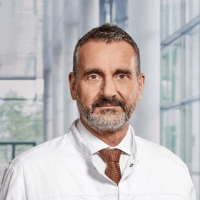Pulmonary Valve Stenosis — Pulmonary Valve Pepair (reconstruction): treatment in the Best Hospitals of Germany
Treatment prices are regulated by national law of the corresponding countries, but can also include additional hospital coefficients. In order to receive the individual cost calculation, please send us the request and medical records.

Department of Cardiothoracic Surgery
According to the Focus magazine, the Department of Cardiothoracic Surgery ranks among the top German medical facilities specializing in the surgical treatment of diseases of the cardiovascular system and lung cancer! The department offers the full range of surgical services for the treatment of diseases of the cardiovascular system, respiratory tract, including heart and lung transplantation, artificial heart implantation. The therapeutic options include aortic surgery, coronary artery bypass grafting, transplantation surgery, surgical treatment of heart rhythm disorders (arrhythmias), minimally invasive surgery, surgical treatment of the heart valves, including reconstructive interventions. All operations are performed using state-of-the-art technology and in accordance with the current recommendations of professional societies.






Department of Cardiac Surgery
The Department of Cardiac Surgery provides a full range of surgical treatment in its area of specialization. Special emphasis is placed on heart valve repair and replacement surgery, coronary artery bypass grafting, thoracic aortic surgery, adult congenital and acquired heart disease surgery, pacemaker and defibrillator implantation, and artificial heart implantation for severe heart failure. Many heart operations are performed using minimally invasive techniques, which has a positive effect on the healing of the surgical wound. Minimally invasive cardiac procedures also reduce surgical risks and contribute to a rapid recovery of the patient in the postoperative period. Surgical treatment of cardiac pathologies is performed in advanced operating rooms equipped with the latest technology. The cardiac surgeons of the department successfully perform routine and complex surgical procedures, saving the lives of thousands of patients. The specialists work in accordance with current clinical protocols and follow the recommendations of the German Society for Thoracic and Cardiovascular Surgery (DGTHG).


Department of Cardiothoracic Surgery and Vascular Surgery
The Department of Cardiothoracic Surgery and Vascular Surgery provides effective surgical treatment for diseases of the heart, respiratory system, and blood vessels. The team of cardiac surgeons operates on patients with heart valve pathologies, coronary heart disease, heart failure, and heart rhythm disturbances. In the field of thoracic surgery, the key focus is on the surgical removal of lung tumors and lung metastases. The specialists in this area also perform surgery to repair chest wall deformities. In the field of vascular surgery, interventions for abdominal and thoracic aortic aneurysms are most often performed here. The department's vascular surgeons are also exceptionally competent in the treatment of peripheral occlusive arterial disease. A great advantage for the department's patients is that almost all surgical interventions are performed using minimally invasive techniques, so there is no need for a long postoperative recovery. The department's operating rooms are equipped with state-of-the-art technology. This allows for effective and safe treatment. The priority is always personalized medical care for patients.






Pulmonary valve stenosis is a congenital, rather than acquired, heart disease. The opening of the heart valve narrows, so it becomes increasingly difficult for blood to enter the pulmonary circulation. As a result, the right ventricle is overloaded and heart failure develops. You can undergo your pulmonary valve stenosis treatment in Germany and expect good and long-term results.
Content
- Who may need pulmonary valve replacement surgery?
- How is pulmonary valve replacement surgery performed?
A surgical intervention is performed on an open heart using a heart-lung machine. Doctors implant an artificial prosthesis, usually a biological one, instead of the patient's own pulmonary valve. Endoprosthesis replacement surgery is performed using a minimally invasive technique.
You can seek medical attention at the University Hospital Essen, the University Hospital Ulm, or the University Hospital Oldenburg.
You are welcome to use the services of the medical tourism agency Booking Health. We will contact the hospital administration and schedule an appointment for you on the dates you specify. We will book the most suitable airline tickets and a hotel room for you and help you apply for a visa, etc. Our employees will meet you at the airport and take you to the hospital by car. During treatment, your personal coordinator will always be in touch with you.
Who may need pulmonary valve replacement surgery?
Pulmonary valve replacement surgery in Germany is not very common, as this is not the main treatment option.
Whenever possible, cardiosurgery doctors perform a balloon valvuloplasty. It is a minimally invasive procedure with a short recovery time for patients. It is performed through an incision in the groin without a thoracotomy. Doctors deliver a balloon to the heart valve area, inflate it with liquid, and as a result, its opening expands.
If minimally invasive treatment is not possible, hospitals with cardiosurgery departments perform pulmonary valve repair.
Heart valve replacement surgery is resorted to if it is impossible to repair the valve, as well as in the case of a combination of stenosis and severe valvular insufficiency.
How is pulmonary valve replacement surgery performed?
Pulmonary valve replacement surgery in the cardiosurgery departments in Germany is usually performed using an open surgical technique. Doctors implant only biological heart valves in this area since mechanical ones are unsafe. The increased risk of blood clots after their implantation persists even with the constant use of anticoagulants.
The service life of artificial heart valves in children is 5-10 years, and in adults, it is 15-30 years. In any case, most patients undergo more than one operation during their lives. In Germany, revision heart valve replacement surgery after the wear of the first prosthesis can be performed by the endovascular technique through an incision in the groin.
You can use the Booking Health website to make an appointment for your pulmonary valve stenosis treatment at one of the German clinics. You will receive top-class medical care in this country. Operations are safe and have high success rates. On our website, you can find out the surgical treatment cost and compare prices at different hospitals. When you book your treatment through our website, your medical costs will be reduced due to the lack of high taxes for foreign patients.
Authors:
The article was edited by medical experts, board-certified doctors Dr. Nadezhda Ivanisova and Dr. Vadim Zhiliuk. For the treatment of the conditions referred to in the article, you must consult a doctor; the information in the article is not intended for self-medication!
Sources:

